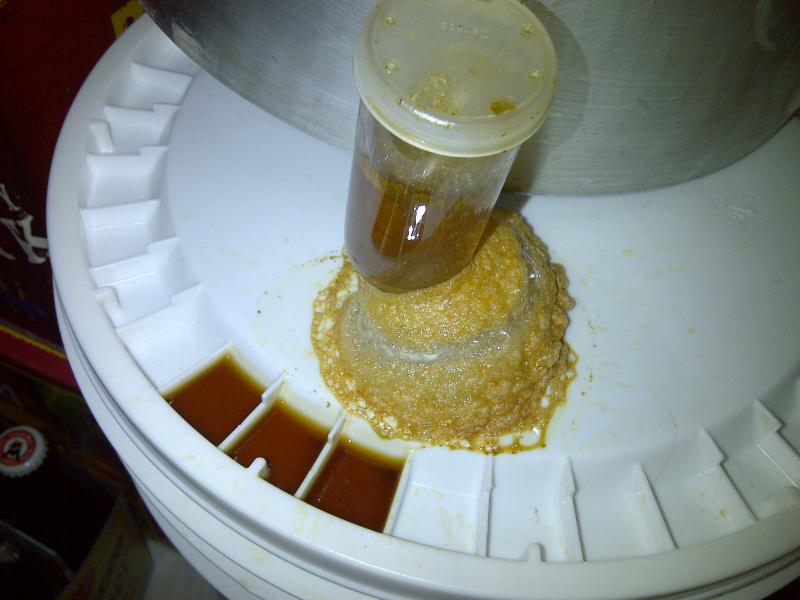WHITE HOUSE HONEY PORTER
Ingredients
2 (3.3 lb) cans light unhopped malt extract
3/4 lb Munich Malt (cracked)
1 lb crystal 20 malt (cracked)
6 oz black malt (cracked)
3 oz chocolate malt (cracked)
1 lb White House Honey
10 HBUs bittering hops
1/2 oz Hallertaur Aroma hops
1 pkg Nottingham dry yeast
3/4 cup corn sugar for bottling
Directions
1. In a 6 qt pot, add grains to 2.25 qts of 168˚ water. Mix well to bring temp down to 155˚. Steep on stovetop at 155˚ for 45 minutes. Meanwhile, bring 2 gallons of water to 165˚ in a 12 qt pot. Place strainer over, then pour and spoon all the grains and liquid in. Rinse with 2 gallons of 165˚ water. Let liquid drain through. Discard the grains and bring the liquid to a boil. Set aside.
2. Add the 2 cans of malt extract and honey into the pot. Stir well.
3. Boil for an hour. Add half of the bittering hops at the 15 minute mark, the other half at 30 minute mark, then the aroma hops at the 60 minute mark.
4. Set aside and let stand for 15 minutes.
5. Place 2 gallons of chilled water into the primary fermenter and add the hot wort into it. Top with more water to total 5 gallons if necessary. Place into an ice bath to cool down to 70-80˚.
6. Activate dry yeast in 1 cup of sterilized water at 75-90˚ for fifteen minutes. Pitch yeast into the fermenter. Fill airlock halfway with water. Ferment at room temp (64-68˚

for 3-4 days.
7. Siphon over to a secondary glass fermenter for another 4-7 days.
8. To bottle, make a priming syrup on the stove with 1 cup sterile water and 3/4 cup priming sugar, bring to a boil for five minutes. Pour the mixture into an empty bottling bucket. Siphon the beer from the fermenter over it. Distribute priming sugar evenly. Siphon into bottles and cap. Let sit for 1-2 weeks at 75˚.
WHITE HOUSE HONEY ALE
Ingredients
2 (3.3 lb) cans light malt extract
1 lb light dried malt extract
12 oz crushed amber crystal malt
8 oz Bisquit Malt
1 lb White House Honey
1 1/2 oz Kent Goldings Hop Pellets
1 1/2 oz Fuggles Hop pellets
2 tsp gypsum
1 pkg Windsor dry ale yeast
3/4 cup corn sugar for priming
Directions
1. In a 12 qt pot, steep the grains in a hop bag in 1 1/2 gallons of sterile water at 155 degrees for half an hour. Remove the grains.
2. Add the 2 cans of the malt extract and the dried extract and bring to a boil.
3. For the first flavoring, add the 1 1/2 oz Kent Goldings and 2 tsp of gypsum. Boil for 45 minutes.
4. For the second flavoring, add the 1/2 oz Fuggles hop pellets at the last minute of the boil.
5. Add the honey and boil for 5 more minutes.
6. Add 2 gallons chilled sterile water into the primary fermenter and add the hot wort into it. Top with more water to total 5 gallons. There is no need to strain.
7. Pitch yeast when wort temperature is between 70-80˚. Fill airlock halfway with water.
8. Ferment at 68-72˚ for about seven days.
9. Rack to a secondary fermenter after five days and ferment for 14 more days.
10. To bottle, dissolve the corn sugar into 2 pints of boiling water for 15 minutes. Pour the mixture into an empty bottling bucket. Siphon the beer from the fermenter over it. Distribute priming sugar evenly. Siphon into bottles and cap. Let sit for 2 to 3 weeks at 75˚.




